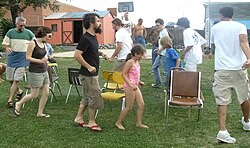| Revision as of 16:18, 3 February 2021 editSidP (talk | contribs)Autopatrolled, Extended confirmed users, Pending changes reviewers40,925 edits →Gameplay: circle not necessarily← Previous edit | Revision as of 23:31, 23 February 2021 edit undoPjesnik21 (talk | contribs)Extended confirmed users35,502 edits →In popular cultureTags: Mobile edit Mobile web edit Advanced mobile editNext edit → | ||
| Line 30: | Line 30: | ||
| ==In popular culture== | ==In popular culture== | ||
| In the musical '']'', during the song "The Art of the Possible", ] and a group of other military officers play a game of musical chairs which Perón wins, symbolizing his rise to power. | In the musical '']'', during the song "The Art of the Possible", ] and a group of other military officers play a game of musical chairs which Perón wins, symbolizing his rise to power. | ||
| In the historical drama '']'', prisoners of the ] are forced to play the game by the ] guards who execute the losers to entertain the visiting ] officials. | |||
| ==See also== | ==See also== | ||
Revision as of 23:31, 23 February 2021
Elimination genre party game "Trip to Jerusalem" redirects here. For the public house in Nottingham, see Ye Olde Trip to Jerusalem. For other uses, see Musical chairs (disambiguation).| This article needs additional citations for verification. Please help improve this article by adding citations to reliable sources. Unsourced material may be challenged and removed. Find sources: "Musical chairs" – news · newspapers · books · scholar · JSTOR (February 2021) (Learn how and when to remove this message) |
Musical chairs, also known as Trip to Jerusalem, is a game of elimination involving players, chairs, and music. It is a staple of many parties worldwide.
Gameplay
A set of chairs is arranged with one fewer chair than the number of players (for example, seven players would use six chairs). While music plays, the contestants walk around the set of chairs. When the music stops abruptly, all players must find their own individual chair to occupy. The player who fails to sit on a chair is eliminated. A chair is then removed for the next round, and the process repeats until only one player remains and is declared the winner.
History of the name
The origins of the game's name, Trip to Jerusalem, is disputed. However, it is known to come from its German name Reise Nach Jerusalem ("The Journey to Jerusalem"). One theory suggests that the name was inspired by the Crusades, wherein several heavy losses were incurred. Another theory suggests that it was inspired by the Aliyah, the immigration of Jews from the diaspora to the Land of Israel (which includes the modern State of Israel), wherein it is stated that spaces on ships taking the Jews to the said land were limited. None of these theories were officially confirmed.
As metaphor
The term "playing musical chairs" is also a metaphor for describing any activity where items or people are repeatedly and usually pointlessly shuffled among various locations or positions. It can also refer to a condition where people have to expend time searching for a resource, such as having to travel from one gasoline station to another when there is a shortage. It may also refer to political situations where one leader replaces another, only to be rapidly replaced due to the instability of the governing system (see cabinet shuffle).
In popular culture
In the musical Evita, during the song "The Art of the Possible", Juan Perón and a group of other military officers play a game of musical chairs which Perón wins, symbolizing his rise to power.
In the historical drama Dara of Jasenovac, prisoners of the Jasenovac concentration camp are forced to play the game by the Ustasha guards who execute the losers to entertain the visiting Nazi officials.
See also
References
- Orlick, Terry (2006). "No-Elimination Games". Cooperative Games and Sports: Joyful Activities for Everyone. Human Kinetics. p. 21. ISBN 9780736057974.
| Party games | |
|---|---|
| Guessing games | |
| Other games | |
